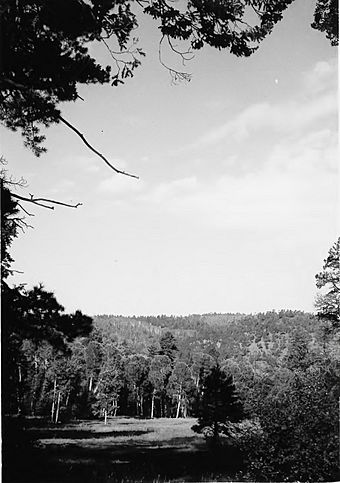C. Hart Merriam Base Camp Site facts for kids
|
C. Hart Merriam Base Camp Site
|
|

The meadow at Merriam's base camp site, 1964
|
|
| Nearest city | Flagstaff, Arizona |
|---|---|
| Area | 2.5 acres (1.0 ha) |
| Built | 1889 |
| NRHP reference No. | 66000173 |
Quick facts for kids Significant dates |
|
| Added to NRHP | October 15, 1966 |
| Designated NHL | December 21, 1965 |
The C. Hart Merriam Base Camp Site is a special historic campsite. It is found in the Coconino National Forest, just north of Flagstaff, Arizona. This place is important because of its connection to Clinton Hart Merriam. He was a very early eco-biologist in the United States. An eco-biologist studies how living things interact with their environment. The site was named a National Historic Landmark in 1965. This means it is a place of national importance.
Contents
Exploring the Merriam Camp Site
The Merriam Base Camp Site is located about 20 miles (32 km) northwest of Flagstaff, Arizona. It sits within the beautiful Coconino National Forest. You can find it near U.S. Highway 180, close to where two forest roads meet. The famous Arizona Trail also passes nearby this historic spot.
High Up in the Mountains
The campsite is quite high up, at about 8,300 feet (2,500 meters) above sea level. It is on a small hill in the foothills of Humphreys Peak. Close by is a natural spring called Little Spring, which flows from a green meadow. This high-up location was perfect for scientific study.
Merriam's Big Ideas
This camp was where Clinton Hart Merriam did important fieldwork. At the time, he led a group that later became the United States Fish and Wildlife Service. His research here helped him create the idea of "life zones."
What are Life Zones?
Merriam studied the San Francisco Peaks area. He noticed that different plants and animals lived in different parts of the mountains. He realized that where living things are found depends on things like how high up they are (altitude) and how warm or cold it is (latitude). This idea of "life zones" helped explain why certain plants and animals live in specific areas. Even though his first ideas were later improved by other scientists, Merriam's work was a big step forward. It changed how people thought about nature and how living things are spread out.
 | Dorothy Vaughan |
 | Charles Henry Turner |
 | Hildrus Poindexter |
 | Henry Cecil McBay |



